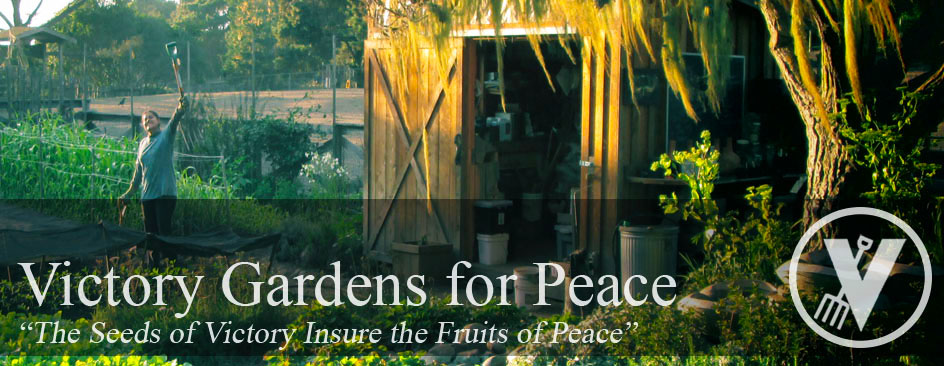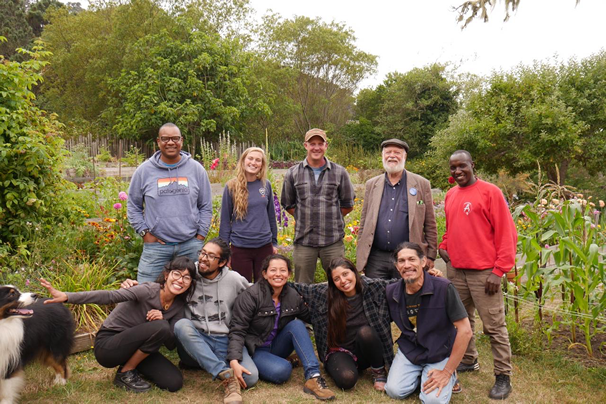Cultivating Hope "When I go into the garden with a spade and dig a bed If I had to sum up why I have hope, it's because in learning to grow my own food sustainably I have discovered that I love doing the work. In discovering this love for doing I have witnessed my perception of the world around me transform. What once seemed like an impossibility now feels like a challenge. I used to look at "problems" as something to avoid. I now see them as a necessary part of the process of becoming whole, of negotiating the blockages which prevent us from moving forward. I believe this to be true not only personally, but on a much larger scale. It is no doubt that we are entering uncharted waters, but even though we see the iceberg in front of us, it seems that most of us are either scrambling around looking for a map, debating the size of the iceberg, or searching for someone else to steer our ship for us. Now, more than ever, we must come to terms with the challenges ahead, and proactively make changes in our own lives before it is too late. One of the things I struggle with is that people in my country think that to address our problems we must buy something: organic food, or electric cars, or carbon credits, or pay someone to do the work for us. In our heads, we have become trapped by our consumerism. It feels good to take the money we make and buy something that is less toxic or uses less fossil fuel. That is what we want. What we need is a transformation from centralized, dependent, resource-guzzling consumerism to self-empowered, decentralized, resilient, localized and interconnected communities! We need to draw the connection of localization to sustainability. A few years ago, I was in a brainstorming session with colleagues at Ecology Action and determined that the act of Biointensive gardening is one of the most simple, revolutionary, elegant and sustainable options on the table. We don't have to buy much of anything; we can organize and heal our communities in doing it; we can grow life and food and fix carbon into soil while reaping all the benefits of healthy food, good exercise, the joy in sharing and in beautifying our neighborhoods. But there is another important aspect to this work. What isn't often talked about is that Biointensive sustainable gardening can reduce our impact on the world around us because we need less from the outside and find our power in our own selves and communities. This is, as we are demonstrating at Victory Gardens for Peace, perhaps the greatest effect Biointensive sustainable gardening can have! Carbon farming has become a hot topic in agriculture today. There is much debate on what carbon farming is, or isn't, but as Biointensive gardeners we know that we can grow tall plants which take in carbon, compost those plants, and transform them into soil. It's that simple and far more efficient than using animals to fix carbon. Did you know that if you burn a gallon of fuel, you release over 20 lb of carbon into the atmosphere? Or that the average American diet releases 2 to 6 tons of carbon into the atmosphere each year? All that is saved if we grow our own food using Biointensive techniques in our backyards and community gardens. In fact, in a recent study we did for the City of Fort Bragg, California, we showed that if we used all of the open space within city limits to grow food and soil Biointensively for Fort Bragg's 7,000 inhabitants, each year over 14 million lb of carbon could be prevented from entering the atmosphere; in addition, over 300,000 lb of carbon would be sequestered from air, into plants and into soil! When growing soil and food, one quickly realizes that we aren't "growing plants": we are creating a thriving, healthy soil and fostering the conditions which allow the plants to be healthy on their own. A healthy soil grows healthy plants. In conventional agriculture as we know it today, huge amounts of fertilizers, pesticides and water are used to produce low-quality food while having a tremendous impact on the surrounding environment. Even conventional organics use a tremendous amount of plastic, sprays, and other inputs. Biointensive sustainable gardening reduces our reliance on resources. At the Victory Gardens for Peace research garden at the Stanford Inn Eco-Resort in Mendocino, CA, we are continuing experiments demonstrating how a person can grow all of their food and compost in 1,000-2,000 sq ft—that's 1-2% of the land area and 2-4% of the water it takes to grow a conventional American diet. This also means that rather than using all that land and resources for a conventionally grown diet, you can grow a healthy ecosystem which contributes an abundance of benefits from protecting freshwater aquifers, growing biodiversity, fixing carbon, and providing habitat. What more could you ask for! The great work ahead is transforming our cities and neighborhoods into once again thriving and resilient environments through the creative efforts of growing soil, food and community. It is transforming the current paradigm from dependence on consumerism to becoming the vibrant producers of our own futures. This work is about a renaissance of culture, a rediscovery of our connection to nature and each other and the protection of our living biosphere. It is a rebirth of purpose and a celebration of life. These solutions will become the foundation for a peaceful and sustainable future. It may just be the calling of our time, and what those of us who have inherited the situation are born to accomplish. We hope that you share in our excitement to meet the challenges we all face with creative solutions such as Biointensive sustainable gardening and mini-farming!
top | Newsletter Home |Table of Contents| Archive
|




